Saltwater thinking: valuing the ocean
I’m writing this on a train speeding towards London King’s Cross, Cosmo Sheldrake’s back catalogue in my ears, tuning me in to the more-than-human headspace I’m heading towards. I’m on my way to a week-long course with NYU Law’s More-Than-Human Rights (MOTH) Program, an interdisciplinary initiative exploring how law and policy might evolve to recognise the rights and well-being of humans, nonhumans, and the web of life that binds us.
About half an hour ago, the train hit a deer. We stopped while the driver checked for damage. The voice on the tannoy described it as “a bit of splatter” and reassured us we’d back on our way shortly. Death but background noise.
The MOTH Programme emerges from a growing recognition that our detachment from nature is neither natural nor sustainable. For too long, law and culture have reinforced the illusion of human supremacy, treating the living world as resource, scenery, or collateral. But the grip of that worldview is beginning to loosen. And through the cracks, new ideas are emerging.
Somewhere between Berwick and York, I found myself re-reading an essay I wrote last December for a class on Values and the Environment. I had focused on the multiple crises facing the world’s oceans and asked whether reimagining how we value the environment - beyond human benefit - might offer better ways forward. And I wanted to share.
ꕀ
The oceans, vast and utterly vital to all our lives on Earth, are facing multiple interconnected and compounding crises - from pollution and overfishing to acidification and rising temperatures. All are exacerbated by the accelerating impacts of climate change.
The deeply harmful practices that have gotten us here stem from a worldview that positions humans as separate from and dominant over nature, and that reduces the ocean to a resource for our extraction, exploitation, and waste. Colonialism, capitalism, and industrialisation have spread this human-centred way of thinking around the world and marginalised other ways of valuing the ocean - ways that focus on mutual care and our deep connection to the ecosystem around us. The severing of our relationship with nature has been described as a ‘metabolic rift’ - a fundamental separation between humanity and the natural world. This metabolic rift creates a ‘sensory estrangement’, i.e. a disconnect between us and the sensory, emotional, and relationship aspects of the ecosystems that sustain us. This disconnection, in turn, exacerbates the crises, creating a vicious cycle in which the more we devaluate the ocean, the more we deepen our detachment from it.
Our environmental values shape how we interact with the environment and guide our perceptions of what is important, from our everyday behaviours to broader policy and the way we manage resources. These values are influenced by cultural and spatial factors, like where we live and how traditions inform our perspectives. Environmental values are commonly classified into three categories: instrumental, intrinsic, and relational. Instrumental value focuses on nature’s usefulness to us, such as how it can be used for economic gain or the services it can provide. This perspective fails to account for the interconnected systems and relationships that sustain life, reducing nature to a resource for exploitation. Intrinsic value, on the other hand, recognises nature’s inherent worth. Whilst this represents a step beyond usefulness, it often emphasises abstract qualities like beauty or purity which risk continuing to distance us from nature by focusing on aesthetics. Relational values go beyond these limitations by focusing on cultural, spiritual, and reciprocal relationships. They emphasise the ways in which our identities, communities, and wellbeing are deeply intertwined with the health and integrity of the world around us.
It goes without saying that the crises facing the world’s oceans demand urgent attention and multifaceted responses. This essay does not address technical solutions such as advancements in marine science, policy implementation, or large-scale industrial reform. Nor does it engage deeply with specific Indigenous practices or decolonial frameworks, though I recognise these are essential to the broader discourse on sustainable ocean stewardship. Instead, this essay focuses on the philosophical shift required to transform how we value the marine world and rethink our relationship with the ocean.
ꕀ
The crises facing the ocean affect lots of different ecosystems across its vast expanse and depths, from surface waters to the deepest hadalpelagic zones. Interconnected issues ripple through these in subtle yet devastating ways. Our public concern often fixates on charismatic megafauna, like whales and sea turtles, whose relatable traits can overshadow the complexities of less familiar or attractive species. But these overlooked life forms are essential to understanding the cascading impacts of oceanic crises on our ecological stability. To be able to fully comprehend these, we need to think across multiple scales and senses and consider all dimensions of marine lifeworlds - from the microscopic to the massive, the visually appealing to the ugly, and surface waters to the deepest, darkest depths.
At the core of these crises is humanity’s longstanding treatment of the ocean as a dumping ground, rooted in the belief that its vastness can absorb waste without consequence. We could call this valuing the ocean instrumentally. For centuries, it has served as a trash can for the things we deem most abject - from industrial waste, sewage, and nuclear materials, to the bodies of oppressed peoples. The ocean is treated like it has unlimited capacity to assimilate waste, its vastness seen not as a fragile ecosystem, but as an inexhaustible sink for what we discard.
This is starkly illustrated by the levels of pollution currently entering the ocean. In 2019, 1.7 million tonnes of plastic waste entered marine ecosystems, a figure projected to surpass 4 million tonnes annually by 2060. Microplastics now permeate everywhere, threatening coral reefs, mangroves, and food webs critical to marine and human health. Pollution from sewage and agricultural runoff exacerbates these impacts, creating hypoxic dead zones, while even the ocean’s deepest trenches contain traces of banned toxins and plastics.
The ocean’s role as a repository for the disposable extends beyond the material to human lives, as seen historically in the disposal of enslaved people overboard and today in the loss of asylum seekers during perilous sea crossings. These journeys are driven by desperation but these lives are classified as disposable. Those who perish are subsumed into the ocean – it is a space of both literal and symbol erasure.
Our exploitative oceanic relationship extends beyond pollution to the commodification of the ocean itself through things like overfishing and deep-sea mining. These activities reflect the instrumental value ascribed to the ocean’s resources, viewed primarily as assets to be extracted for economic gain. Only 64.6% of global fish stocks are fished sustainably, with industrial fishing causing severe declines in species such as tuna, sharks, and rays, and leaving millions of communities reliant on small-scale fishery vulnerable. Deep-sea mining – a new, truly horrific, frontier of exploitation - risks the release of toxins resulting in habitat and biodiversity destruction.
Climate change compounds all of these crises through rising sea temperatures, acidification, and melting ice caps. Coral reefs have lost 50% of their coverage since the 1950s, while warming waters force species to migrate, disrupting ecosystems. Sonic pollution from shipping and sonar further harms marine mammals by disrupting their communication and navigation. This destabilises critical carbon-sequestering ecosystems like mangroves and seagrasses. At the core of these disruptions lies a pattern of undervaluing the role of marine ecosystems as life-giving forces, compared to their immediate economic and industrial utility.
Addressing these crises requires us to establish a different relationship, rooted in care, mutual respect, and sustainable coexistence. These ideas are deeply embedded in Indigenous and non-Western knowledge systems. For example, the Māori of Aotearo (New Zealand) personify the ocean as Tangaroa, a god and ancestor who embodies the interconnection of people, land, and sea. This sacred relationship is honoured through sustainable practices such as reserving untouched fishing areas and observing seasonal restrictions to allow fish stocks to replenish. Similarly, people of the Lummi Nation, based in the Pacific Northwest of Washington create kinship with marine life through their concept of orcas as qwe’lhol’mechen (relations under the waves). This relational view guides stewardship practices such as opposing industrial projects that threaten marine habitats and maintaining traditional fishing methods. Inuit communities across Alaska, Canada, and Greenland practise sustainable hunting methods that respect the intricate ecological balance of marine environments. For example, hunting quotas for seals and whales are closely monitored to prevent overharvesting, while every part of the animal is used to reduce waste and honour its life when hunted. These practices show that relationality can be more than just a jargony philosophical framework but a ‘lived ethic’, shaping the way we act and interact with the marine world.
Despite the enduring impacts of colonialism, these practices continue, and they offer profound insights into how we could reimagine our relationship with the ocean in ways that prioritise reciprocity, interdependence, and long-term ecological balance.
Cultural theorist Astrida Neimanis has done some incredible work in this space. For example, by creating the concept of the hydrocommons. Rooted in the broader idea of commoning, the hydrocommons positions bodies of water as inherently shared resources. She highlights how water connects all bodies - human and more-than-human - through its material flow across living beings, ecosystems, and geological and atmospheric systems as part of the hydrological cycle. This constant movement - through rivers, oceans, clouds, and bodies - links life across time and space, with every drop of water in our bodies having passed through countless others – human and otherwise - and weaving together past, present, and future ecologies.
Hydrocommoning as a theory promotes collective responsibility for aquatic resources. It emphasises equitable access, preventative care, integrated knowledge systems, global solidarity, and holistic ecosystem management. In practice, this includes community-led water management to ensure equitable distribution, such as providing clean drinking water to marginalised communities, alongside measures like stricter pollution regulations, wetland protection, and watershed restoration. Integrated knowledge systems refers to combining scientific research with Indigenous expertise to develop sustainable practices, such as rotational fishing or traditional water conservation. Global solidarity is about international cooperation to tackle challenges like plastic pollution and rising sea levels while resisting exploitative practices. And holistic ecosystem management means safeguarding habitats such as mangroves, coral reefs, and aquifers to sustain the global hydrological cycle. Embracing the hydrocommons demands a transformation of human-ocean relationships towards a collective ethic of care, accountability, and interdependence.
A specifically oceanic manifestation of this vision is Lobo & Parsons’ concept of saltwater co-belonging, which reimagines human connections to marine environments through shared care and accountability. I remember reading this term and bursting out in goosebumps. The idea finds tangible expression in initiatives like the Argyll Hope Spot on Scotland’s west coast and the Berwickshire Marine Reserve on the east coast, where local communities and organisations collaborate to protect biodiversity and promote sustainable practices. These projects embody hydrocommoning by fostering a shared cultural and ecological identity and uniting fishers, environmental groups, schools, scientists, and residents in a grassroots effort to safeguard the regions’ unique marine ecosystem.
Central to these initiatives are a sense of community pride and ownership. Schoolchildren participate in educational programmes that nurture ocean stewardship, while generations of local fishers contribute frontline knowledge to complement scientific research, shaping inclusive conservation strategies. Events, workshops, and celebrations further encourage collective participation, deepening the community’s connection to the marine environment as both a cultural and ecological asset. By rejecting extractive resource use and positioning the marine environment as central to community identity, they demonstrate how hydrocommoning can create sustainable, inclusive, and relational approaches to marine protection.
This ethos is grounded in the recognition that collective action begins with individual encounters with the ocean. These initiatives exemplify this by facilitating both community-wide activities and recognising the transformative potential of personal, embodied engagement with the sea. Hands-on workshops and direct interactions with the ocean’s rhythms and textures invite individuals to forge meaningful connections to the sea.
The role of these sensory experiences in curating empathy, connection and a kind of ‘ecological conscience’ absolutely fascinate me. Philosopher Merleau-Ponty was of the belief that the body is the primary site of knowing. Any of us with any exposure to trauma work will understand this completely. Physical interactions with the ocean form the foundation for our understanding of and meaning-making around it. Through embodied experiences – the dissolving of bodily boundaries that happens when we touch, smell, be in -, we can develop a kind of skin knowledge, situate ourselves within ecosystems, and ultimately reshape our identities, values, and sense of place. These encounters challenge our detachment from the more-than-human world. They can include all sorts of activities, from contemplative practices like walking along the shore, collecting sea glass or listening to waves, to fully immersive experiences like kayaking, snorkelling or diving.
To fully appreciate these relationships, we must engage in close encounters with the marine world - immersing ourselves in its textures, sounds, and sensations.
ꕀ
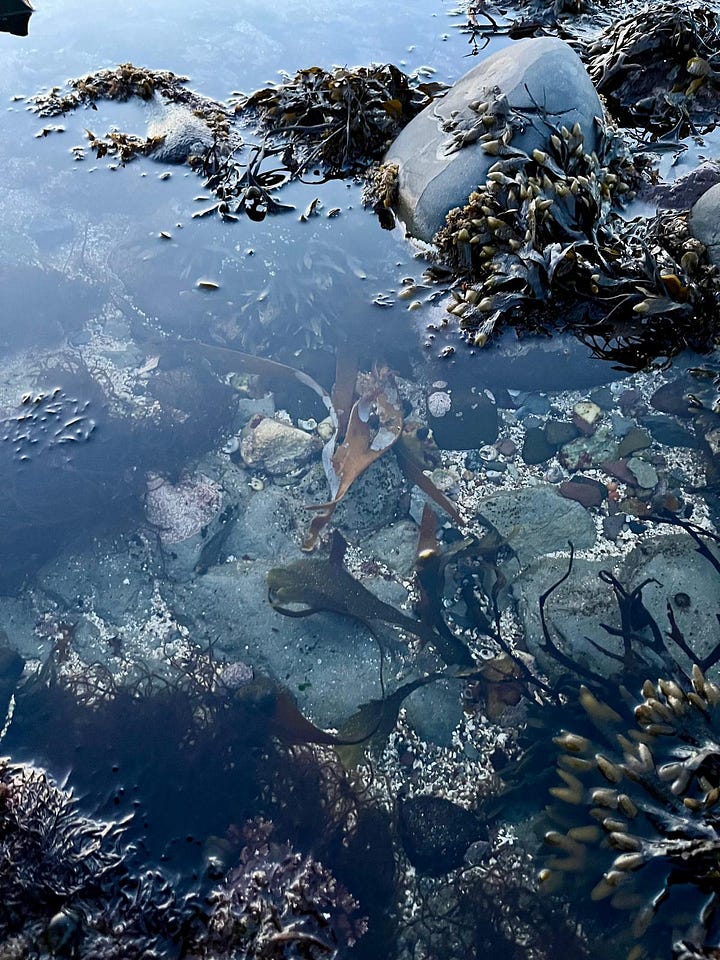
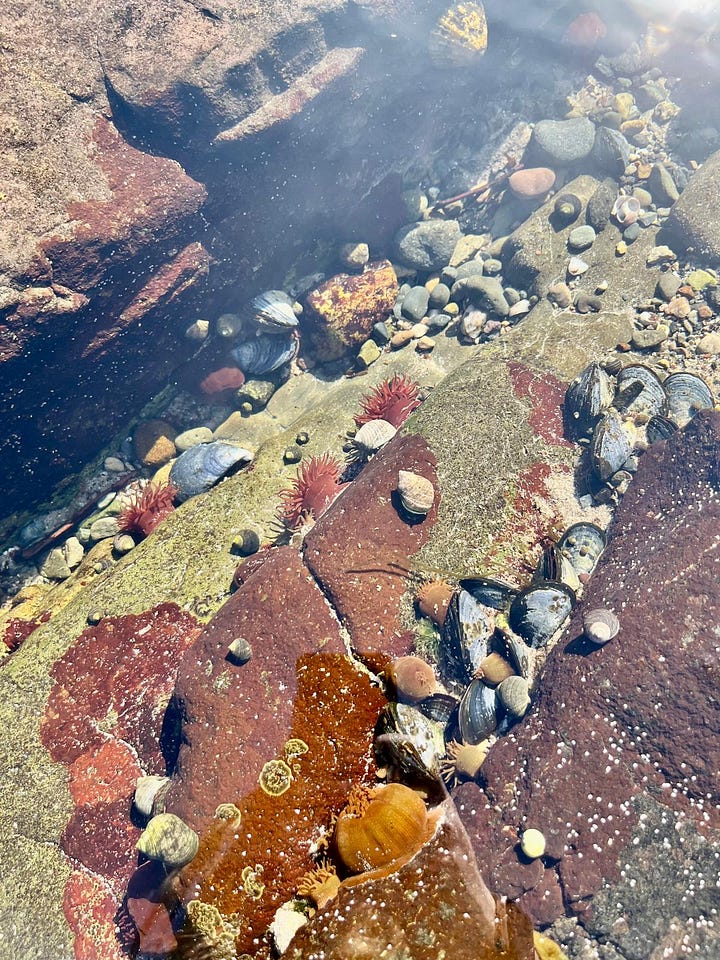
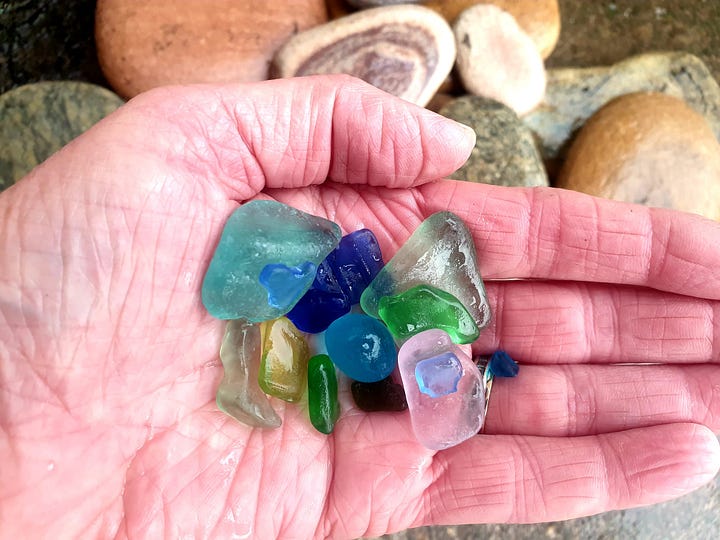
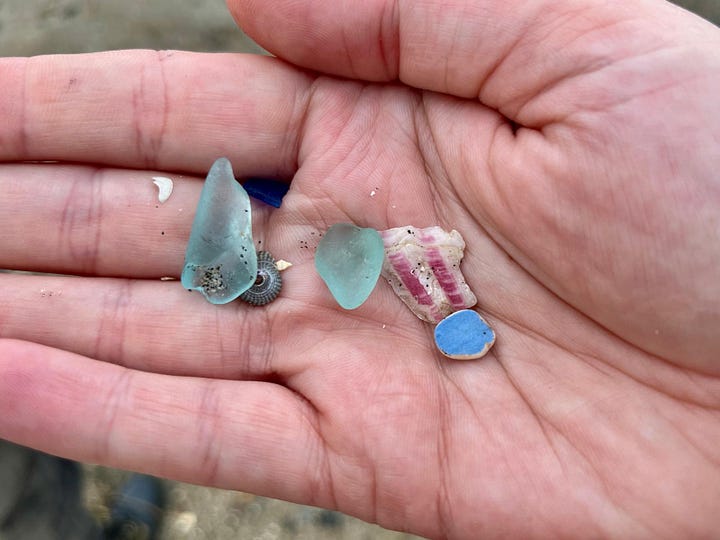
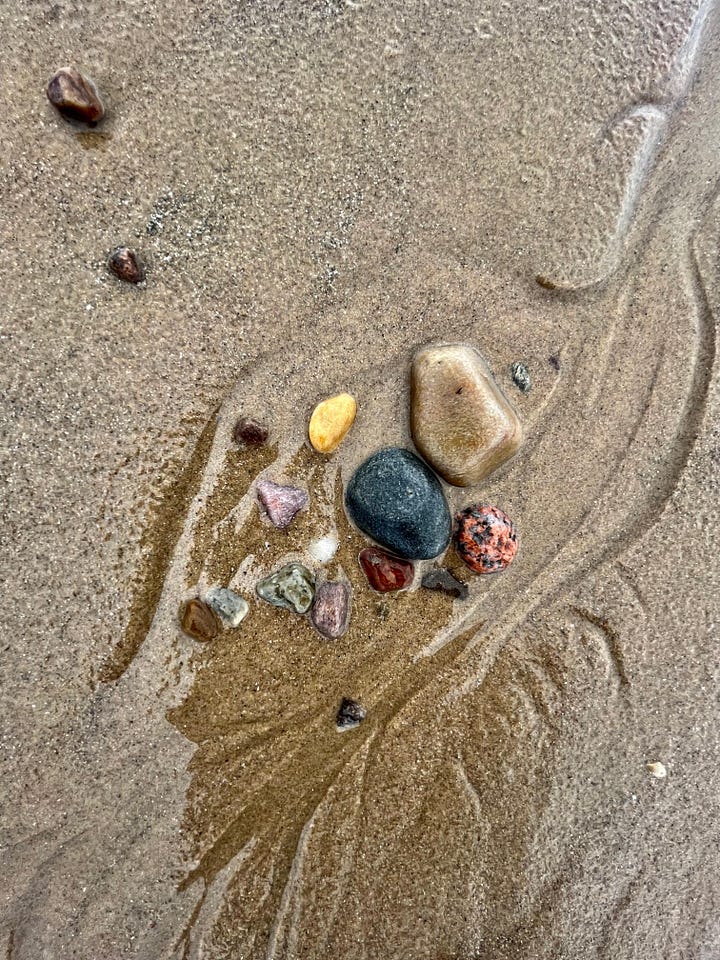
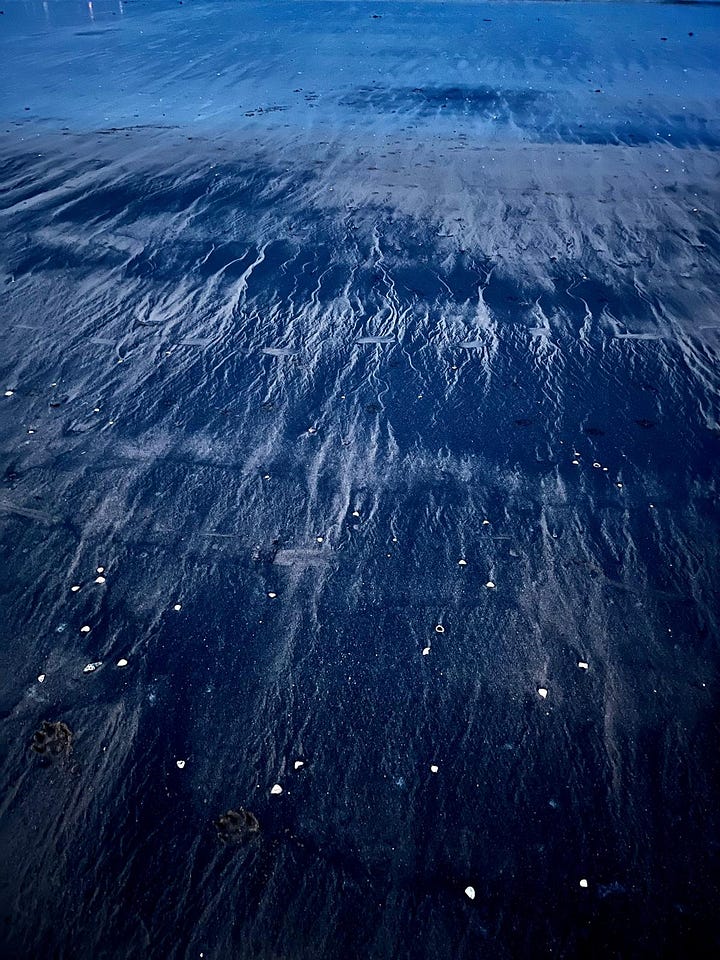
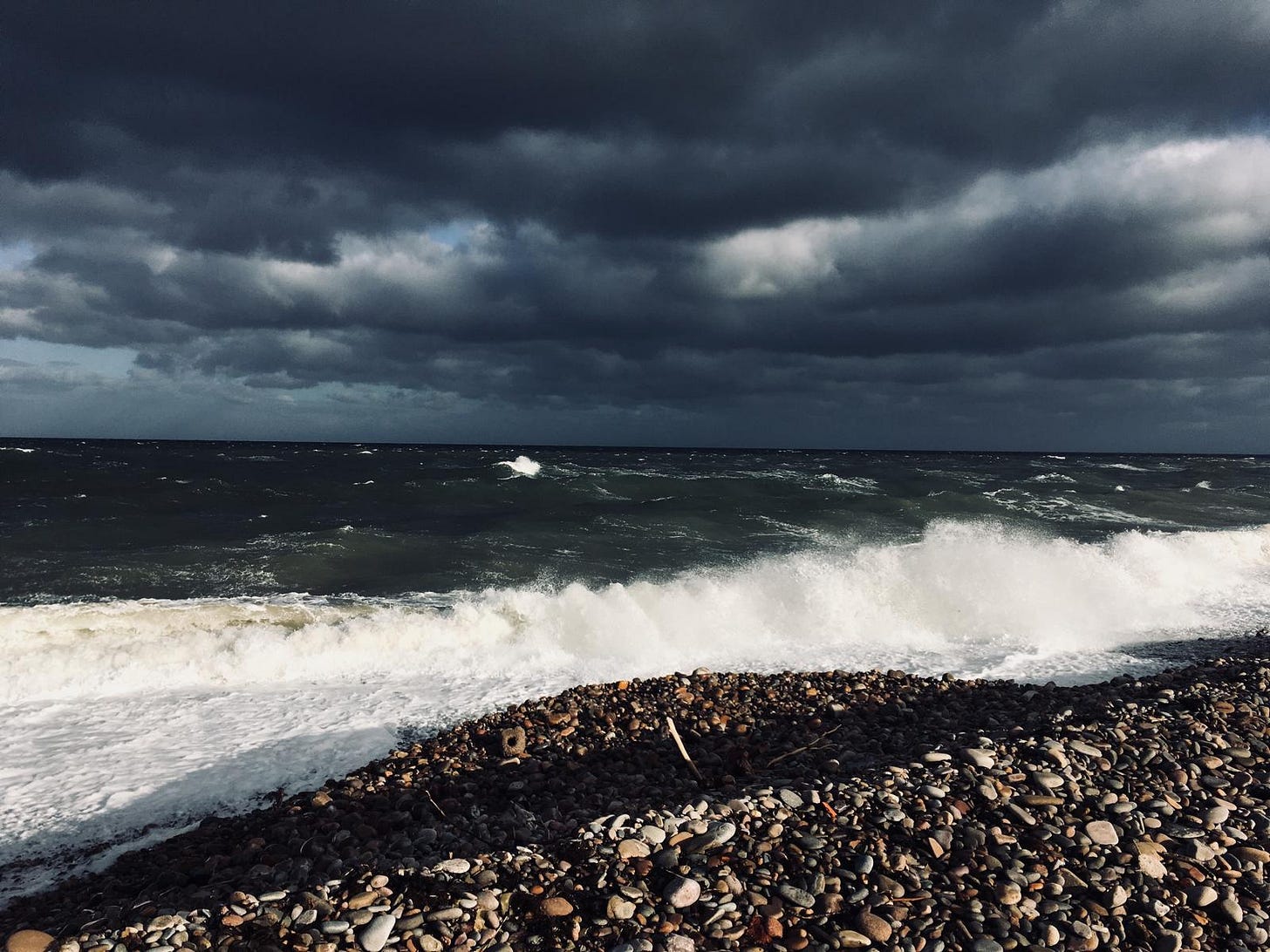
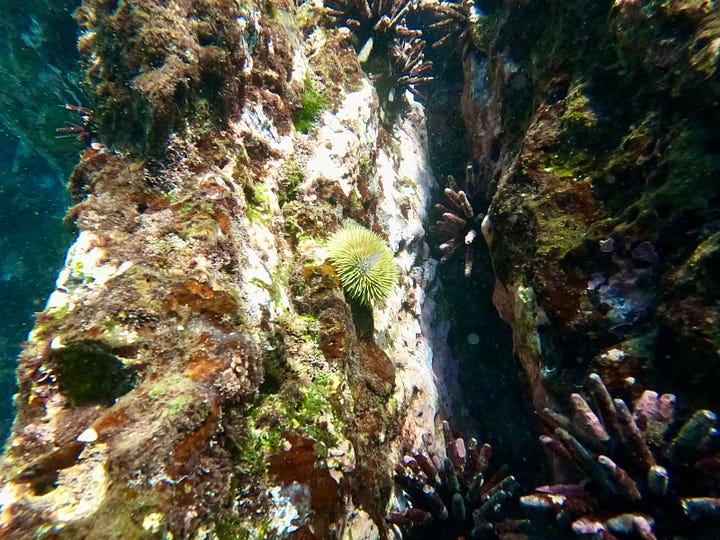
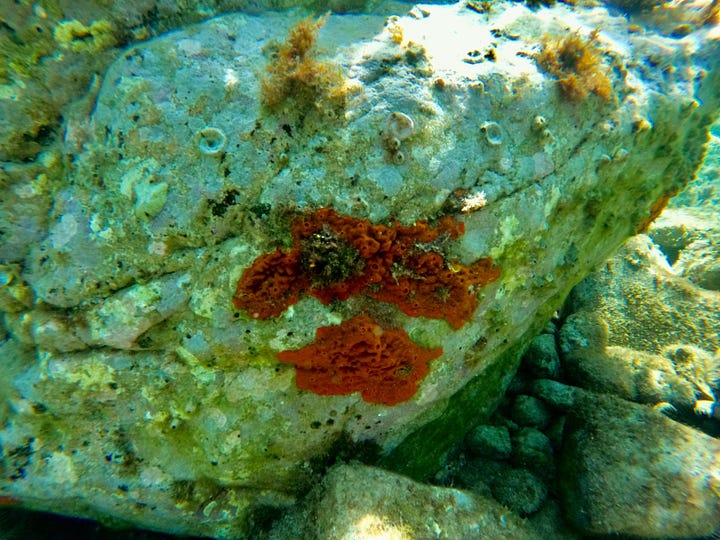
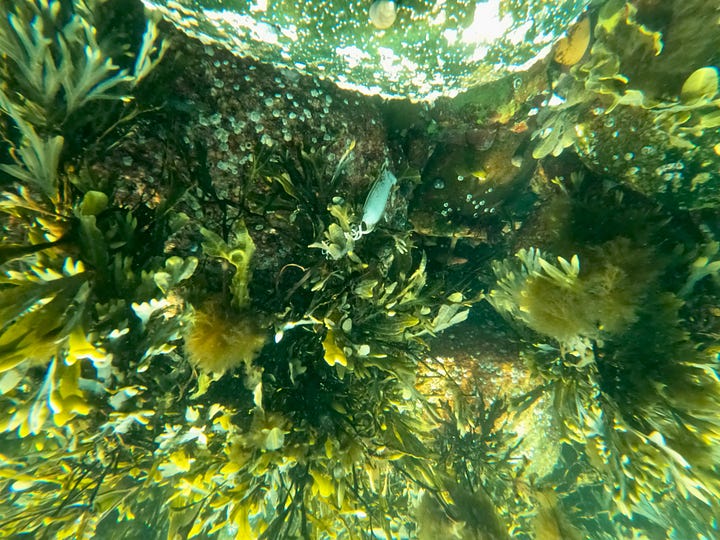
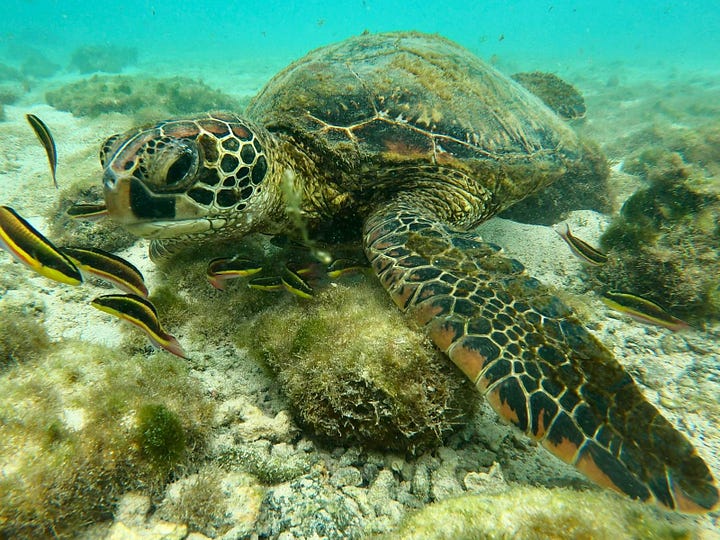
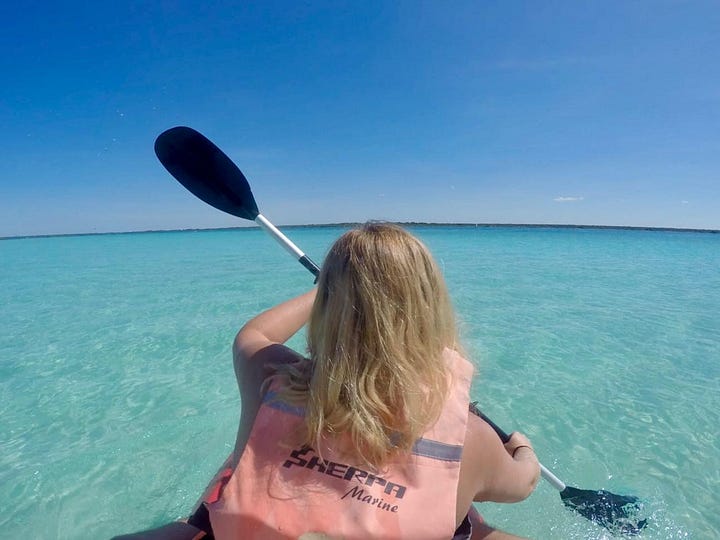
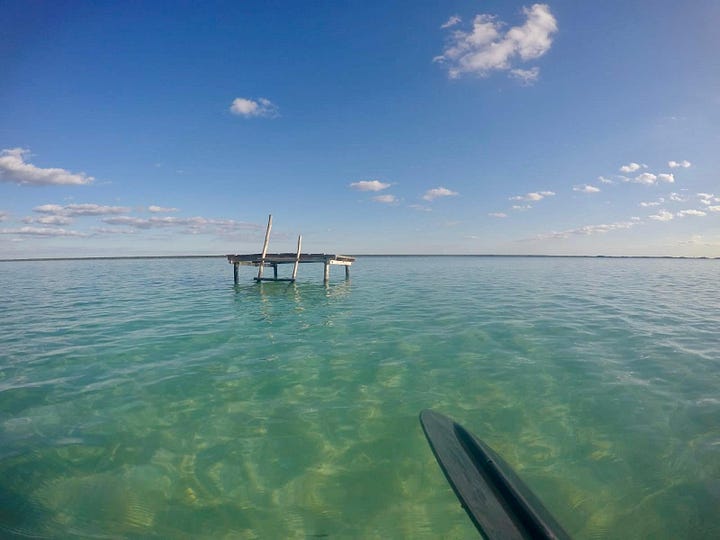
ꕀ
I believe that scaling these kinds of sensory experiences is essential for inspiring large-scale cultural and ecological reclamation. These interactions can attune us to the ocean’s rhythms and flows, inspire collective action, and drive systemic change. They draw us into relational, transitional spaces where land, sea, and body converge, blurring the boundaries between human and more-than-human worlds . Through multisensory, embodied engagement with the ocean’s rhythms and textures, we become active co-participants in the world around us.
Recognising the power of such engagement, environmental organisations are increasingly prioritising initiatives that bring these experiences to wider communities, particularly those who might not typically have access to blue spaces. Initiatives like the Scottish Wildlife Trust’s snorkel trails aim to make Scotland’s underwater ecosystems accessible to all, providing detailed access and safety information. These trails encourage participants to explore the marine life in their own ‘backyards’, offering encounters not just with charismatic species but with often-overlooked ecosystems like kelp forests, sand eels, and vibrant anemones in calm, sheltered waters.
Seaful’s Vitamin Sea Project introduces young carers, schoolchildren, and refugees to activities like snorkelling and rockpooling, allowing them to experience the chill of the water, the pull of tides, and the tactile richness of marine life. Similarly, the Marine Conservation Society engages individuals in hands-on activities such as beach surveys and species monitoring, immersing them in the textures and movements of tidal zones.
Seawilding offers hands-on opportunities like planting seagrass meadows, sea safaris to explore coastal marine life, and native oyster restoration. These initiatives foster curiosity, stewardship, and deeper connections to marine ecosystems. By creating opportunities for embodied, accessible engagement, these initiatives help cultivate relational values that challenge anthropocentric detachment and foster the care, reciprocity, and responsibility we need to address the systemic crises facing the world’s oceans.
Changing the way we value the environment holds transformative potential to address the systemic forces driving these crises. Capitalism, industrialism, and neocolonialism thrive on separating humans from the more-than-human world so they can exploit ecosystems for profit and externalise harm to marginalised communities and ecosystems in the Global South. Prioritising interdependence and reciprocity challenges this extractive logic, which underpin so many destructive practices.
This reconfiguration also decentres profit-driven decision-making, paving the way for policies that prioritise ecological health. Relationality provides a framework for restorative practices such as marine ecosystem rewilding, sustainable resource use, and resistance to exploitative industries. Recognising the intrinsic value of non-human life and embracing interdependence lays the groundwork for systems that balance human needs with ecological wellbeing.
Reimagining environmental values also challenges the cultural narratives sustaining systemic harm, such as the myths of infinite growth and the commodification of nature. By fostering a cultural ethos rooted in reciprocity and interdependence, we can inspire collective action and systemic transformation. When scaled and integrated, these values have the potential to disrupt exploitative systems and guide the emergence of sustainable, inclusive, and equitable futures for both human and more-than-human communities. In an era of ecological crisis, reconfiguring our relationship with the natural world is not only transformative but imperative.
ꕀ
